Selecting the best food for large breed dogs is crucial for maintaining your Golden Retriever’s health, energy levels, and longevity throughout their adult years. Large breed dogs like Golden Retrievers have unique nutritional requirements that differ significantly from smaller breeds, making specialized nutrition essential for optimal health outcomes.
This comprehensive guide explores everything you need to know about big breed dog food, from understanding nutritional requirements to selecting premium brands that support your Golden Retriever’s specific health needs. Whether you’re transitioning from puppy food or seeking to improve your adult dog’s current diet, this guide provides the expertise you need to make informed decisions.
Understanding what constitutes the best food for large breed dogs requires knowledge of canine nutrition science, breed-specific health considerations, and practical feeding strategies that support long-term wellness in Golden Retrievers.
Contents
- 1 Understanding Large Breed Dog Nutritional Requirements
- 2 Types of Big Breed Dog Food Available
- 3 Essential Nutritional Components in Best Food for Large Breed Dogs
- 4 Activity-Based Nutrition for Golden Retrievers
- 5 Top Brands for Best Food for Large Breed Dogs
- 6 Feeding Guidelines for Adult Golden Retrievers
- 7 Special Dietary Considerations for Golden Retrievers
- 8 Transitioning Between Dog Foods
- 9 Life Stage Nutrition Considerations.
- 10 Cost Analysis of Best Food for Large Breed Dogs.
- 11 Homemade vs. Commercial Best Food for Large Breed Dogs.
- 12 Seasonal Feeding Adjustments.
- 12.1 Summer Feeding Considerations.
- 12.2 Winter Activity Changes.
- 12.3 Holiday and Travel Adjustments.
- 12.4 What makes food specifically suitable for large breed dogs?
- 12.5 How much should I feed my adult Golden Retriever daily?
- 12.6 When should I switch from puppy food to adult large breed food?
- 12.7 Is grain-free food better for Golden Retrievers?
- 12.8 How do I know if my Golden Retriever needs a different food?
- 12.9 Can I mix wet and dry food for my Golden Retriever?
- 12.10 How often should I change my Golden Retriever’s food brand?
- 12.11 What ingredients should I avoid in large breed dog food?
- 12.12 Do senior Golden Retrievers need special large breed food?
- 12.13 How do I transition between different large breed dog foods safely?
- 13 Final Thoughts
Understanding Large Breed Dog Nutritional Requirements
Golden Retrievers, as large breed dogs, face unique nutritional challenges that require specialized dietary approaches different from their smaller counterparts. Their size, metabolism, and genetic predispositions create specific requirements that the best food for large breed dogs must address comprehensively.
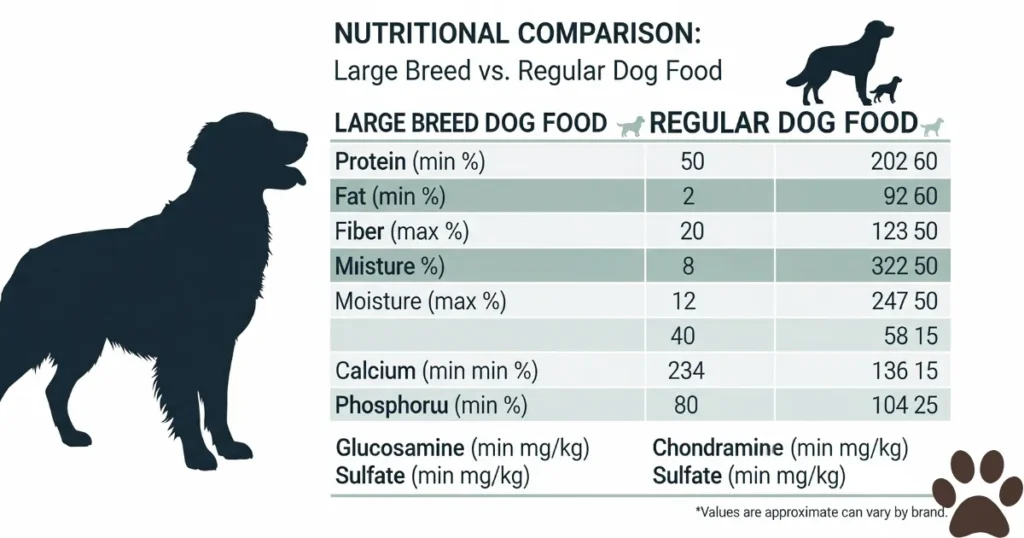
Metabolic Differences in Large Breed Dogs
Large breed dogs like Golden Retrievers have slower metabolic rates per pound compared to smaller breeds, meaning they require fewer calories per pound of body weight. However, their larger overall size means they still consume significant quantities of food, making nutrient quality paramount in big breed dog food selections.
The best food for large breed dogs accounts for these metabolic differences by providing appropriate caloric density without excess calories that can lead to obesity, a common problem in Golden Retrievers that can exacerbate joint issues and reduce lifespan.
Joint Health Considerations
Golden Retrievers are genetically predisposed to hip dysplasia, elbow dysplasia, and other joint conditions that proper nutrition can help manage. The best food for large breed dogs includes joint-supporting ingredients like glucosamine, chondroitin sulfate, and omega-3 fatty acids that help maintain cartilage health and reduce inflammation.
Adult Golden Retrievers benefit from big breed dog food that provides ongoing joint support rather than waiting for problems to develop. Preventive nutrition through quality food choices can significantly impact joint health outcomes throughout their lifetime.
Breed-Specific Health Factors
Golden Retrievers face specific health challenges, including cancer predisposition, heart conditions, and skin sensitivities that nutrition can influence. The best food for large breed dogs addresses these concerns through antioxidant-rich ingredients, heart-healthy nutrients, and hypoallergenic formulations when necessary.
Types of Big Breed Dog Food Available
The big breed dog food market offers numerous options, each with distinct advantages and considerations for Golden Retriever owners seeking optimal nutrition.
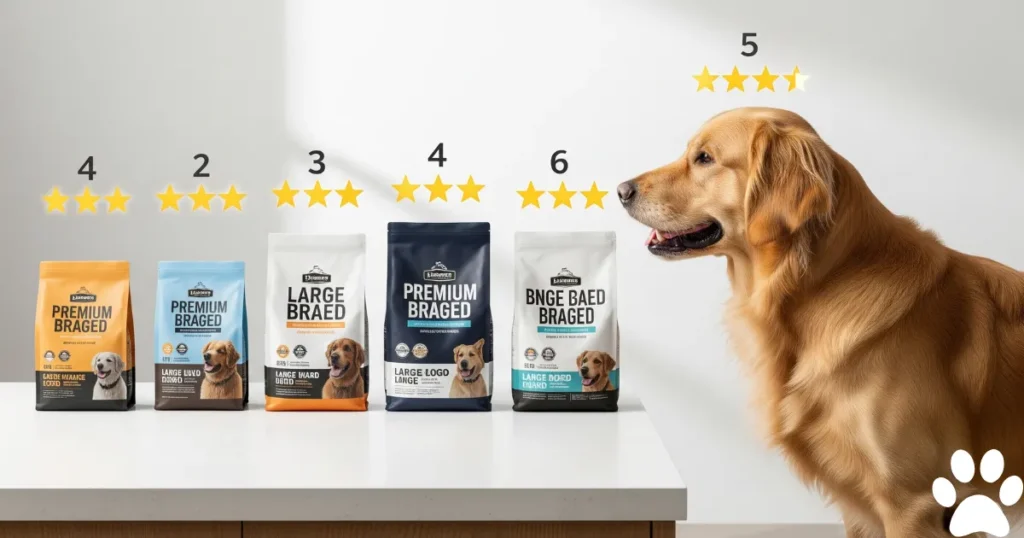
Dry Kibble Options
Best large breed dry dog food represents the most popular choice for Golden Retriever owners due to convenience, cost-effectiveness, and dental health benefits. Quality dry foods provide complete nutrition in shelf-stable formats that support busy lifestyles.
The best dry food for large dogs features appropriately sized kibble that encourages proper chewing and provides dental benefits while delivering balanced nutrition. Dry foods also typically offer the best value per serving for large dogs with substantial appetites.
Wet Food Alternatives
Wet foods provide higher moisture content and often enhanced palatability compared to dry options. Some Golden Retrievers with dental issues or decreased appetite benefit from the softer texture and stronger flavors of quality wet big breed dog food.
Combining wet and dry formats can provide advantages of both, with wet food enhancing palatability while dry kibble supports dental health and provides cost-effective nutrition for large appetites.
Fresh Dog Food Services
Modern fresh dog food delivery services offer restaurant-quality ingredients in scientifically formulated recipes designed specifically for large breed dogs. These services provide convenience while maintaining nutritional quality and ingredient transparency.
Fresh food services often customize recipes based on individual dog characteristics, including breed, age, weight, and activity level, making them attractive options for Golden Retriever owners seeking personalized nutrition.
Raw and Freeze-Dried Options
Raw diets and freeze-dried foods offer minimally processed nutrition that some Golden Retriever owners prefer. However, these options require careful attention to food safety, nutritional balance, and feeding protocols to ensure safety and completeness.
Essential Nutritional Components in Best Food for Large Breed Dogs
Understanding key nutritional components helps Golden Retriever owners evaluate different best food for large breed dogs options and make informed selections based on their dog’s specific needs.
Protein Requirements for Adult Large Breed Dogs
Adult Golden Retrievers require 18-25% protein in their diet, with higher percentages appropriate for active dogs and lower percentages suitable for less active or senior dogs. The best food for large breed dogs uses high-quality protein sources that provide complete amino acid profiles.
Quality protein sources like chicken, fish, lamb, and beef should appear as the first ingredients in big breed dog food formulations. Avoid foods relying heavily on plant proteins or generic meat meals as primary protein sources.
Fat Content and Essential Fatty Acids
The best food for large breed dogs contains 8-15% fat, providing essential fatty acids and energy without promoting obesity. Omega-3 fatty acids from fish oil support coat health, joint function, and cognitive health in Golden Retrievers.
Balanced omega-3 to omega-6 ratios help manage inflammation and support skin health, particularly important for Golden Retrievers prone to skin sensitivities and allergies.
Carbohydrate Sources and Energy
Quality carbohydrate sources in big breed dog food provide sustained energy and fiber for digestive health. Whole grains, sweet potatoes, and legumes offer better nutritional value than corn or wheat fillers commonly found in lower-quality foods.
The best food for large breed dogs balances carbohydrate content to provide energy without excess calories that can contribute to weight gain in less active Golden Retrievers.
Vitamins, Minerals, and Supplements
Comprehensive vitamin and mineral profiles ensure Golden Retrievers receive all essential nutrients for optimal health. The best food for large breed dogs includes appropriate levels of calcium and phosphorus for bone health maintenance without the excessive levels problematic during puppyhood.
Activity-Based Nutrition for Golden Retrievers
Golden Retrievers’ activity levels significantly influence their nutritional requirements, making activity-based feeding strategies essential for optimal health outcomes.
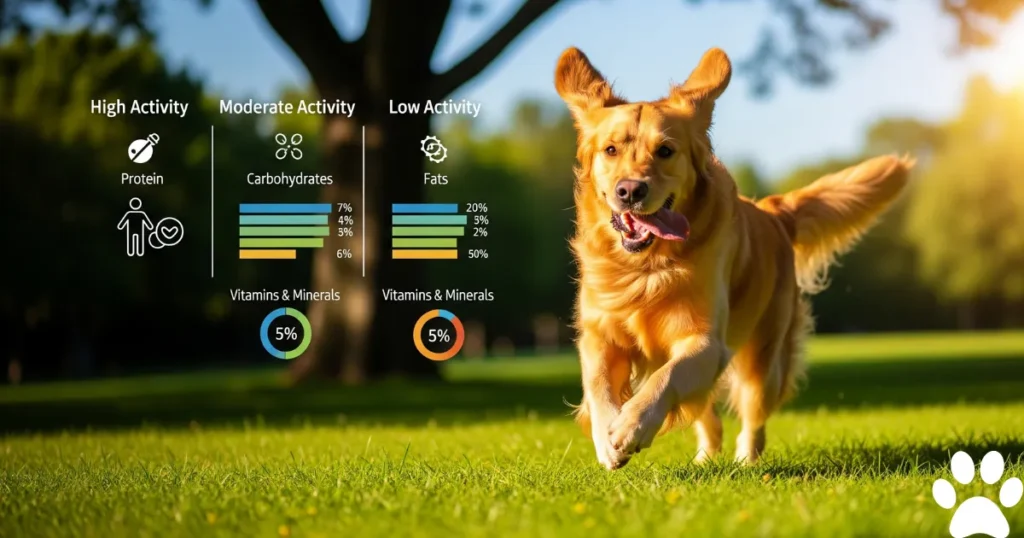
High-Activity Golden Retriever Nutrition
Working Golden Retrievers, hunting dogs, or highly active pets require increased calories and protein from best food for large breed dogs formulations designed for active lifestyles. Performance formulas typically contain 20-30% protein and 12-18% fat to support increased energy demands.
Active dogs also benefit from enhanced electrolyte content and recovery nutrients that support muscle health and endurance during extended activity periods.
Moderate Activity Requirements
Most pet Golden Retrievers fall into the moderate activity category, requiring standard big breed dog food formulations with balanced nutrition supporting daily walks, play sessions, and regular exercise routines.
These dogs typically thrive on maintenance formulas containing 18-22% protein and 8-12% fat, providing adequate nutrition without excess calories that could lead to weight gain.
Low Activity and Senior Considerations
Less active or senior Golden Retrievers benefit from best food for large breed dogs with reduced caloric density to prevent obesity while maintaining nutritional quality. Senior formulas often include enhanced joint support and easily digestible ingredients.
Lower fat content (6-10%) helps manage weight while maintaining palatability and providing essential fatty acids for coat and skin health in older Golden Retrievers.
Top Brands for Best Food for Large Breed Dogs
Several premium brands consistently produce high-quality big breed Top dog food specifically formulated for Golden Retrievers and similar large breeds.
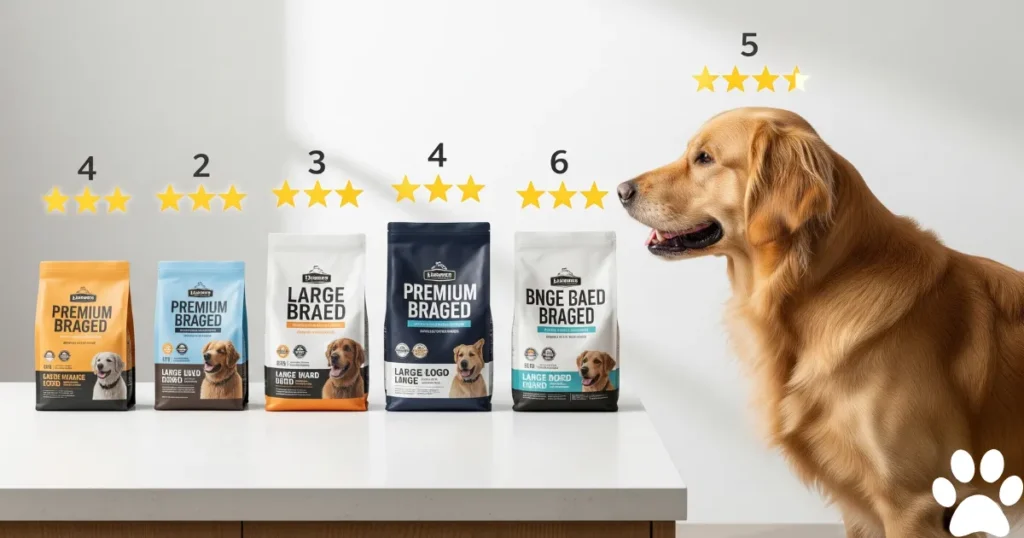
Premium Brand Options
Royal Canin Golden Retriever Adult continues their breed-specific approach into adulthood, providing tailored nutrition addressing Golden Retrievers’ unique needs, including coat health, joint support, and digestive wellness.
Hill’s Science Diet Large Breed Adult offers clinically proven nutrition with controlled calorie content and joint-supporting ingredients, making it an excellent best food for large breed dogs for weight management and joint health.
Purina Pro Plan Large Breed Adult features guaranteed live probiotics supporting digestive health and immune function, crucial for maintaining Golden Retriever health throughout their adult years.
Highest Rated Dog Food Selections
Consumer and veterinary ratings consistently recognize certain brands as providing exceptional nutrition for large breed dogs. These highest rated dog food options combine nutritional excellence with palatability and proven health outcomes.
Orijen Large Breed offers biologically appropriate nutrition with fresh, regional ingredients and high protein content suitable for active Golden Retrievers seeking premium nutrition.
Wellness CORE Large Breed provides grain-free nutrition with high protein content and joint-supporting ingredients, appealing to owners seeking natural nutrition options.
Budget-Friendly Quality Choices
Diamond Naturals Large Breed Adult delivers quality nutrition at moderate prices, featuring real meat proteins and appropriate nutrient levels for Golden Retriever health needs.
Nutro Ultra Large Breed Adult combines multiple protein sources with superfoods, providing excellent nutrition value for budget-conscious Golden Retriever owners.
Feeding Guidelines for Adult Golden Retrievers
Proper feeding protocols maximize the benefits of best food for large breed dogs while supporting optimal weight management and health outcomes.
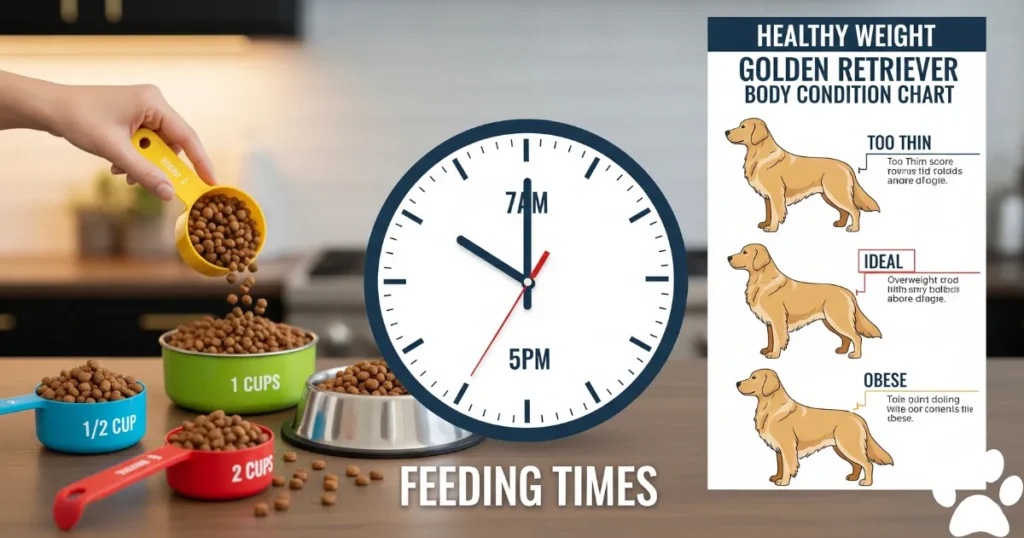
Daily Feeding Schedules
Most adult Golden Retrievers thrive on twice-daily feeding schedules that provide consistent nutrition while supporting digestive health. Dividing daily food portions into two meals helps prevent bloat and maintains steady energy levels.
Feed adult Golden Retrievers morning and evening meals approximately 12 hours apart, adjusting timing based on family schedules and the dog’s individual preferences and needs.
Portion Control Strategies
Use measuring tools to ensure consistent portions when feeding big breed dog food. Golden Retrievers should maintain lean body condition with easily felt ribs and a visible waist tuck when viewed from above.
Adjust portions based on body condition, activity level, and seasonal changes rather than strictly following package guidelines, which provide general recommendations rather than individualized feeding plans.
Weight Management Considerations
Golden Retrievers are prone to obesity, making careful portion control essential when feeding best food for large breed dogs. Excess weight exacerbates joint problems and increases health risks throughout their lifespan.
Monitor body weight regularly and adjust feeding amounts promptly when weight changes occur. Consult veterinarians for guidance on appropriate weight ranges and feeding adjustments for individual dogs.
Special Dietary Considerations for Golden Retrievers
Some Golden Retrievers require specialized versions of best food for large breed dogs due to health conditions, allergies, or individual sensitivities.
Food Allergies and Sensitivities
Common Golden Retriever food sensitivities include chicken, beef, corn, wheat, and dairy products. Limited ingredient big breed dog food formulations help identify and manage food allergies while maintaining nutritional completeness.
Novel protein sources like duck, venison, or fish provide alternatives for Golden Retrievers with protein sensitivities, while grain-free options address cereal allergies.
Joint Health Management
Golden Retrievers with existing joint issues benefit from best food for large breed dogs enhanced with therapeutic levels of joint-supporting ingredients, including glucosamine, chondroitin, MSM, and omega-3 fatty acids.
Some veterinarians recommend prescription joint health diets for Golden Retrievers with significant arthritis or mobility issues, providing targeted nutrition therapy alongside medical treatment.
Skin and Coat Health Support
Golden Retrievers’ beautiful double coats require specific nutritional support from big breed dog food rich in omega fatty acids, zinc, and other nutrients supporting skin and coat health.
Foods containing fish oil, flaxseed, and other sources of essential fatty acids help maintain the lustrous coat and healthy skin Golden Retrievers are known for, while addressing common skin sensitivities.
Weight Management Formulas
Overweight Golden Retrievers benefit from weight management versions of best food for large breed dogs that provide reduced calories while maintaining nutritional completeness and palatability.
These formulas typically contain increased fiber content to promote satiety while reducing caloric density, helping Golden Retrievers lose weight safely without feeling constantly hungry.
Transitioning Between Dog Foods
Proper food transitions prevent digestive upset and ensure Golden Retrievers accept new big breed dog food formulations readily.
Gradual Transition Protocols
Implement 7-10 day transition periods when changing best food for large breed dogs:
- Days 1-2: 75% current food, 25% new food.
- Days 3-4: 50% current food, 50% new food.
- Days 5-6: 25% current food, 75% new food.
- Days 7+: 100% new food.
Monitoring During Changes.
Watch for digestive upset, appetite changes, or behavioral modifications during food transitions. Some adjustment period is normal, but persistent issues may indicate the new food isn’t suitable for your Golden Retriever.
Emergency Transition Situations.
Occasionally, immediate food changes become necessary due to recalls or health issues. In emergencies, probiotics can help support digestive health during rapid transitions to new big breed dog food.
Life Stage Nutrition Considerations.
Golden Retrievers’ nutritional needs evolve throughout their adult years, requiring adjustments to best food for large breed dogs selections based on age and health status.
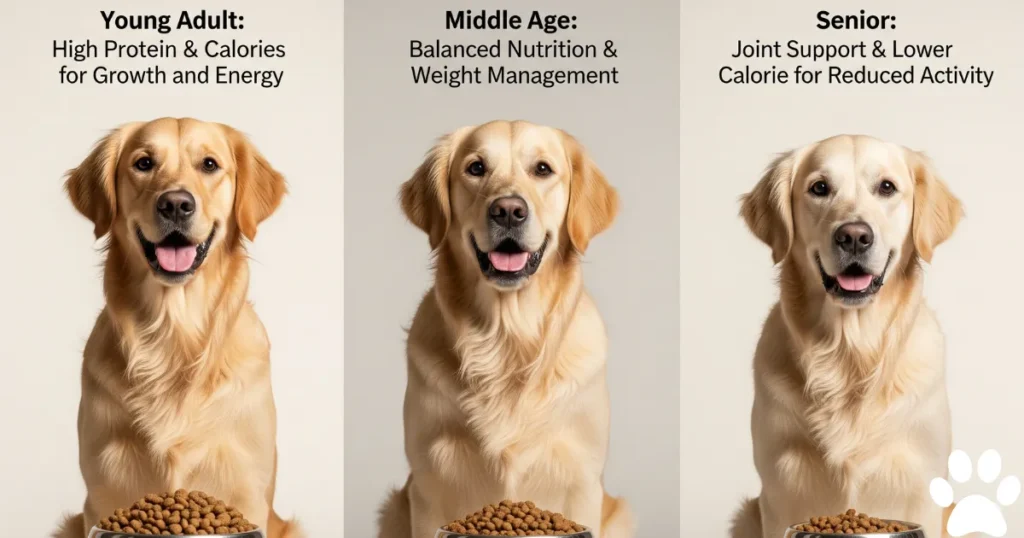
Young Adult (1-3 years).
Young adult Golden Retrievers typically require higher calorie and protein content from big breed dog food to support their active lifestyles and complete development. These dogs often thrive on adult maintenance formulas with 20-25% protein.
Middle Age (3-7 years).
Middle-aged Golden Retrievers benefit from standard adult best food for large breed dogs formulations that maintain optimal body condition while providing joint support and preventive nutrition against age-related health issues.
Senior Transition (7+ years).
Senior Golden Retrievers may require specialized big breed dog food with reduced calories, enhanced digestibility, increased joint support, and antioxidants supporting cognitive health and immune function.
Cost Analysis of Best Food for Large Breed Dogs.
Understanding the true cost of best food for large breed dogs requires analyzing cost per feeding rather than purchase price alone.
Premium vs. Budget Comparison.
Premium big breed dog food often provides better digestibility and nutrient density, meaning smaller portions achieve nutritional goals. Calculate daily feeding costs to understand true value differences between price points.
Long-Term Health Investment.
Quality nutrition through best food for large breed dogs can prevent expensive health problems later, making premium food choices wise financial investments in Golden Retriever health and longevity.
Value-Oriented Selection Criteria.
Focus on nutritional quality, ingredient sourcing, and AAFCO compliance when evaluating big breed dog food options rather than marketing claims or premium pricing alone.
Homemade vs. Commercial Best Food for Large Breed Dogs.
Both homemade and commercial options can provide excellent nutrition for Golden Retrievers, each offering distinct advantages and challenges.
Commercial Food Benefits.
Commercial best food for large breed dogs undergoes extensive testing and formulation to ensure nutritional completeness and safety. Reputable manufacturers provide consistent quality and convenience for busy Golden Retriever owners.
Homemade Diet Considerations.
Homemade diets offer ingredient control and customization but require extensive nutritional knowledge to ensure balanced nutrition. Consult veterinary nutritionists when considering homemade big breed dog food preparation.
Combination Approaches.
Many Golden Retriever owners successfully combine commercial best food for large breed dogs with carefully prepared fresh additions, providing variety while maintaining nutritional balance and convenience.
Seasonal Feeding Adjustments.
Golden Retrievers may require seasonal modifications to their big breed dog food intake based on activity changes and environmental factors.
Summer Feeding Considerations.
Hot weather may reduce Golden Retriever appetites while increasing water needs. Consider feeding smaller, more frequent meals of best food for large breed dogs during extremely hot periods.
Winter Activity Changes.
Increased outdoor activities during pleasant fall and winter weather may require slight increases in big breed dog food portions to maintain optimal body condition and energy levels.
Holiday and Travel Adjustments.
Maintain consistent feeding schedules and food choices during holidays and travel to prevent digestive upset. Pack familiar best food for large breed dogs when traveling to maintain dietary consistency.
What makes food specifically suitable for large breed dogs?
Best food for large breed dogs features controlled calorie density, appropriate protein levels (18-25%), balanced calcium and phosphorus ratios, and larger kibble sizes suitable for large mouths. These formulations address the unique metabolic and health needs of breeds like Golden Retrievers.
How much should I feed my adult Golden Retriever daily?
Most adult Golden Retrievers require 2-3 cups of big breed dog food daily, divided into two meals. Exact amounts depend on age, activity level, and body condition. Always use measuring tools and adjust portions based on your dog’s individual needs rather than package guidelines alone.
When should I switch from puppy food to adult large breed food?
Golden Retrievers should transition from best large breed puppy food to adult best food for large breed dogs between 12-18 months of age, depending on individual development. Consult your veterinarian to determine optimal transition timing based on skeletal maturity.
Is grain-free food better for Golden Retrievers?
Grain-free big breed dog food isn’t necessary for most Golden Retrievers unless they have specific grain allergies. Some grain-free diets have been linked to heart conditions in dogs. Quality grains can provide beneficial nutrients and fiber for Golden Retriever health.
How do I know if my Golden Retriever needs a different food?
Signs your Golden Retriever may need a different best food for large breed dogs include persistent digestive issues, dull coat, low energy, excessive weight gain or loss, or skin problems. Consult your veterinarian before making dietary changes to rule out underlying health issues.
Can I mix wet and dry food for my Golden Retriever?
Yes, combining wet and dry big breed dog food can provide the benefits of both formats. Wet food adds palatability and moisture while dry kibble supports dental health. Ensure the combination maintains appropriate caloric intake for your dog’s needs.
How often should I change my Golden Retriever’s food brand?
Avoid frequent changes in best food for large breed dogs unless necessary for health reasons. Consistent, high-quality nutrition typically provides better results than frequent brand switching, which can cause digestive upset and make it difficult to identify food sensitivities.
What ingredients should I avoid in large breed dog food?
Avoid big breed dog food containing excessive fillers (corn syrup, wheat middlings), artificial colors and flavors, generic meat meals, and foods with inappropriate calcium levels. Focus on foods with named meat proteins as primary ingredients.
Do senior Golden Retrievers need special large breed food?
Senior Golden Retrievers often benefit from specialized best food for large breed dogs with reduced calories, enhanced joint support, increased digestibility, and antioxidants supporting cognitive health. Transition to senior formulas around 7-8 years of age.
How do I transition between different large breed dog foods safely?
Implement gradual transitions over 7-10 days when changing big breed dog food, mixing increasing amounts of new food with decreasing amounts of current food. Monitor for digestive upset and extend the transition period if necessary.
Final Thoughts
Selecting the best food for large breed dogs for your Golden Retriever is a fundamental decision that impacts their health, energy, and quality of life throughout their adult years. This comprehensive guide has explored the essential factors that distinguish quality big breed dog food from generic options, emphasizing the unique nutritional requirements that make specialized large breed nutrition necessary
From understanding metabolic differences and joint health considerations to evaluating premium brands and implementing proper feeding protocols, every aspect of large breed nutrition contributes to your Golden Retriever’s long-term wellbeing. The best food for large breed dogs addresses not just basic nutritional needs but also breed-specific health concerns, including joint support, weight management, and coat health maintenance.
Remember that the most expensive food isn’t always the best choice for your individual Golden Retriever. Focus on nutritional quality, ingredient integrity, and your dog’s response to different big breed dog food options rather than price alone, whether you choose premium brands like Royal Canin and Hill’s Science Diet or quality budget-friendly alternatives. Consistency in feeding high-quality nutrition matters more than frequent brand changes.
As your Golden Retriever ages from young adult through senior years, their nutritional needs will evolve, requiring thoughtful adjustments to their best food for large breed dogs selection. Regular veterinary consultations, body condition monitoring, and attention to your dog’s responses to different foods will guide these important nutritional decisions.
The investment in quality big breed dog food pays dividends in veterinary cost savings, improved quality of life, and the joy of sharing your days with a healthy, energetic Golden Retriever. With the knowledge provided in this guide, you’re equipped to make informed decisions that support your Golden Retriever’s optimal health and happiness throughout their adult years.
Featured Blogs
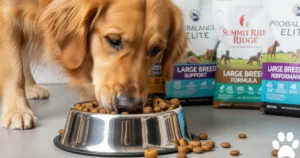
Best Large Breed Dry Dog Food: Complete Guide for Golden Retriever Owners
Choosing the best large breed dry dog food for your Golden Retriever is one of the most important decisions you'll...

Fresh Dog Food for Golden Retrievers: The Complete Guide to Natural Nutrition – 2025
Golden Retrievers are beloved family companions known for their gentle temperament and active lifestyle. As a responsible Golden Retriever owner,...
Dr. Nabeel A.
Hi, I’m Dr. Nabeel Akram – a farm management professional by trade and a passionate Golden Retriever enthusiast at heart. With years of experience in animal science and livestock care, I’ve built a career around understanding animals—how they live, thrive, and bring value to our lives. This blog is a personal project born from that same passion, focusing on one of the most loyal and lovable breeds out there: the Golden Retriever. Whether I’m managing farm operations or sharing insights on canine health, behavior, and care, it all ties back to one core belief—animals deserve thoughtful, informed, and compassionate attention. Welcome to a space where professional expertise meets genuine love for dogs.
Facebook |
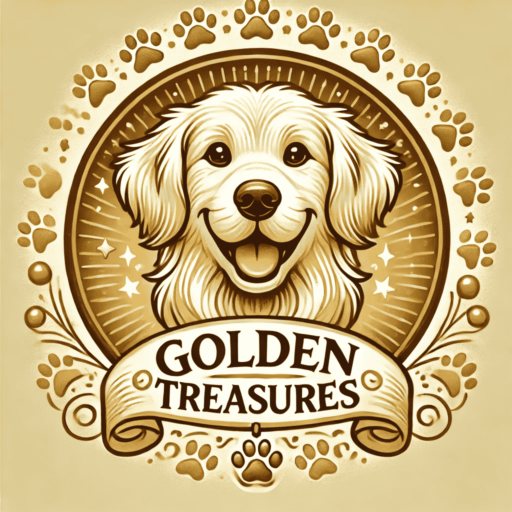
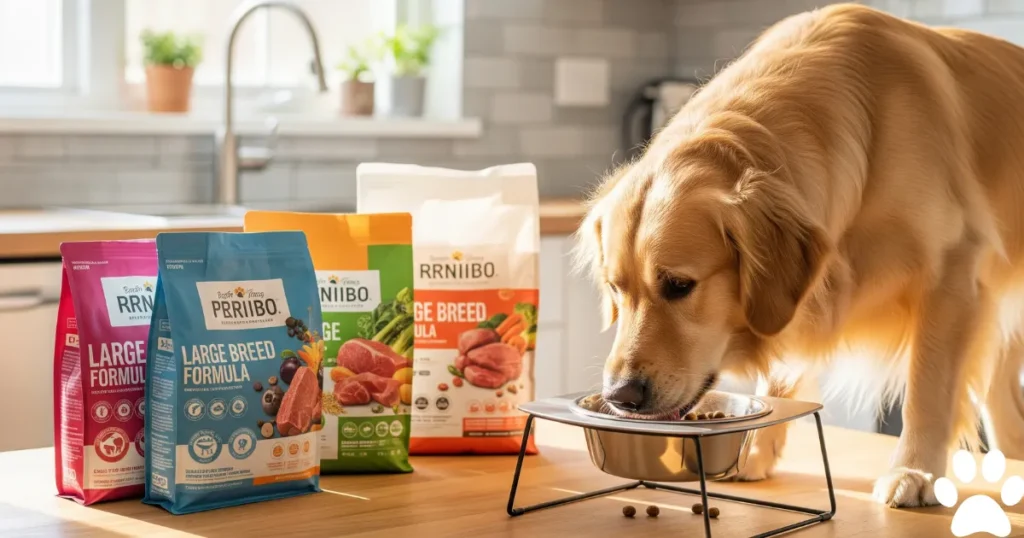
Links will be automatically removed from comments.